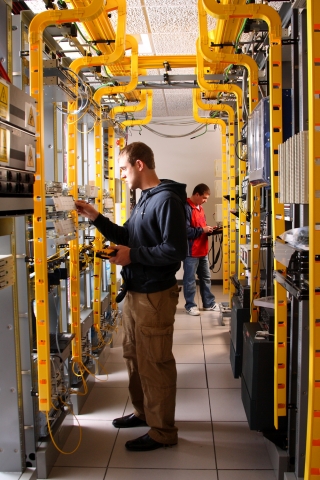Nov152016
Posted at 11:25 AM
Guest blog post by Jennifer Duane, Senior Advisor for Broadband and Public Safety, National Telecommunications and Information Administration
Broadband has become an indispensable driver of economic growth and workforce development, creating new opportunities for Americans to participate in the modern, global economy and changing the way they find and do their jobs. Broadband provides channels for sharing information, learning new skills for career advancement, and completing basic job functions in a number of professions.
Workers in many industries, even those not traditionally technology-centric, now require digital skills to thrive in today’s economy. Many job-seekers, whether a high school student who is looking for a part-time job or a seasoned executive searching for new opportunities, use the Internet to research open positions and submit applications. The number of Americans who use the Internet to look for a job has been steadily increasing from 19 percent of Internet users aged 15 and older in2013 to 27 percent in 2015, according to data collected for the National Telecommunications and Information Administration (NTIA). And an April 2014 study from Georgetown University’s Center on Education and the Workforce found that between 60 to 70 percent of all active job openings in any month are now posted online. The positions themselves often require digital literacy skills to complete basic job functions, such as submitting and tracking orders or entering time worked. To find a new job or even advance in a current one, workers need their skills to match today’s tech-driven job requirements.
Job training is also changing to reflect new trends in web-based education. Job-seekers, students and workers can take courses online to learn new skills or obtain certifications without leaving their home or work location. Broadband allows employees to work from any location, enabling more flexible work arrangements and providing employers with access to a wider pool of talent. At all levels, broadband is transforming the way Americans earn a living.
As the U.S. workforce continues to adapt to the digital economy, it is critical that communities and their anchor institutions such as schools, libraries and hospitals have access to high-speed broadband infrastructure to ensure that working-age adults can access educational opportunities, build job skills and find employment. This is why NTIA put so much emphasis on connecting community anchor institutions as part of NTIA’s broadband grant program funded by the 2009 American Recovery and Reinvestment Act. As part of that program, NTIA’s grantees connected more than 25,000 community anchor institutions to middle mile networks funded with the help of NTIA grants. Communities that lack broadband access have struggled to attract and to retain businesses and have placed their residents at a disadvantage in finding and training for new jobs, often forcing workers and their families to leave the area to find work.
NTIA’s BroadbandUSA program can help communities address this need for broadband. BroadbandUSA provides guidance and technical assistance to communities interested in harnessing the power of broadband to increase economic growth opportunities for their residents. This support includes helping to develop strategies to improve broadband access and digital literacy, advising on the planning and execution of broadband expansion projects, and sharing best practices from NTIA’s broadband experts.
BroadbandUSA works hand-in-hand with local communities to help them enhance their economic potential, and that of their residents, through broadband access and adoption. Contact [email protected] to learn how broadband can help shape and strengthen the skills of a community’s workforce and position them for success in the digital economy.
This blog is a part of a monthly series highlighting the contributions of the Commerce Department’s agencies to the Open for Business Agenda. This month’s focus is on Skills for Business.


